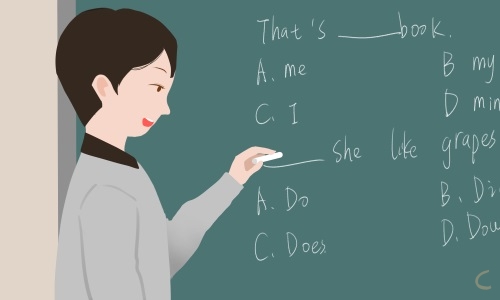英语初一下册知识点梳理
对于英语这门科目,很多刚上初一的学生都感觉很迷茫,不清楚应该要学习哪些知识。下面是小编为大家整理的关于英语初一下册知识点,希望对您有所帮助。欢迎大家阅读参考学习!

英语初一下册知识点
一、词组
be from= come form 来自... pen pal=pen friend 笔友 like and dislike 好恶;爱憎。
live in +地点 在...居住 speak +语言 讲某种语言 play sports 做体育运动a little French 一些法语go to the movies 去看电影 write to sb 给某人写信an action movie 一部动作片 on weekends 在周末tell sb about sth 告诉某人某事Excuse me 对不起,打扰 get to 到达、抵达。
二、句型
1、Where+be+主语+from? 主语+be+from+地点.
2、Where do/does+主语+live? 主语+live/lives in…
3、What language do/does +主语+speak? 主语+speak/speaks….
4、主语+like/likes+doing/to do…
5. What is your favorite subject/sport? My favorite subject/sport is…
6. It’s fun.
7. Is that your new pen pal? Yes, it is.
英语初一下册知识点梳理
一、词组
post office 邮局 pay phone 投币式公用电话 next to 在...隔壁 across from 在...对面
in front of 在...前面 between…and… 在...和...之间 on a street 在街上
in the neighborhood 在附近 on the right/left 在右边/在左边 behind…在…后面
on Green street 在格林街上 near…在…附近 go straight 一直走 welcome to… 欢迎
enjoy+名词/doing喜欢做某事 have fun 过得愉快 play +the+乐器 弹奏乐器
on one’s right/left 在某人的右边/左边 turn right/left 向右/左转 take a walk 散步
have fun 玩得开心 the way to …去...的路 let sb do sth 让某人做某事take a taxi 打的/乘出租车go down(along)…沿着...走 go through...穿过.. have a good trip 旅途愉快 arrive at(小地方) /in(大地方)到达 at the beginning of 在...开始的时候 at the end of 在...结束的'时候 hope to do sth/that/for sth
二、日常交际用语。
1、Is there a bank near here? Yes, there is .It’s on Centre Street. /No, there isn’t.
2、Where’s the supermarket? It’s next to the library.
3、Bridge Street is a good place to have fun.
4、I hope you have a good trip.
5.If you are hungry,you can buy food in the restaurant.
6、Talk a walk though the park..
7. I know you are arriving next Sunday. 我知道你下周日要来。
三、句型。
1、Is there a ….?句型Eg:
-Excuse me.Is there a hotel in the neighborhood. -Yes, there is. No.there isn’t
2、Where is …?句型Eg:
-Where is the park,please? -It’s behind the bank.(肯定回答)-I’m sorry I don’t know. (否定回答)
3、Which is the way to +地点? 句型.例如: - Which is the way to the library.
4、How can I get to +地点?句型.例如: -How can I get to the restaurant?
5、Can you tell me the way to +地点?句型.例 - Can you tell me the way to the post office?
6、Let me tell you the way to my house. 7、Just go straight and turn left.
初一下册英语知识点总结
可数名词变复数
可数名词变复数时,有规则变化和不规则变化两种。
1、规则变化:
1)一般情况直接在词尾加“-s ”,如:cake-cakes, bag-bags, day-days, face-faces, orange-oranges等;
2)以s, x, sh, ch结尾的词,要在词尾加“-es ”,如:bus-buses, watch-watches, box-boxes等;
3)以辅音字母加y结尾的词,变y为i再加“-es ”,如:baby-babies, country-countries, family-families等;
4)部分以f (e)结尾的词,变f (e)为“ves ”,如:knife-knives, half-halves等;
5)以o结尾的词,加“-s ”或“-es ”,如:zoo-zoos, photo-photos, tomato-tomatoes, potato-potatoes等。记忆口诀:除了“英雄”hero外,凡是能吃的,加“-es ”,不能吃的加“-s ”。
2、不规则变化:
1)改变单数名词中的元音字母:man-men, woman-women, foot-feet, tooth-teeth等;
2)单、复同形:sheep-sheep, Chinese-Chinese, Japanese-Japanese等;
3)其他形式:mouse-mice, child-children等。
初一下册英语知识重点
介词用法:
1)具体时间前介词用at。
He gets up at half past seven every day. 他每天七点半起床。
She goes to bed at eleven o’clock. 她十一点睡觉。
2)表示“在早上,在下午,在晚上”的短语中用介词in,且定冠词the不能省略;表示“在中午,在夜里”的短语中介词用at,不加冠词。
in the morning在早上,in the afternoon 在下午,in the evening 在晚上 at noon在中午,at night在夜里
3) 表示“在某天”、“在某天的上午、下午等”的短语用介词on。
What do you usually do on Monday morning? 星期一上午你通常做什么? Do you sometimes go out to eat on Friday evening? 有时你星期五晚上出去吃饭吗?
He watches DVDs on Saturday night. 星期六晚上他看DVD。
Parents take children to parks on June 1. 六月一日,家长们带着孩子去公园。
4)在this, last, next, every等词前面既不加介词,也不用冠词。
What are you doing this afternoon? 今天下午你做什么?
He visits his grandma every Friday. 他每个星期五都去看望祖母。 She is going to Shanghai next Monday. 她下个星期一去上海。
初一英语知识
(一)need和dare的用法
need和dare既可用作情态动词,也可用作实义动词。用作情态动词时,主要用于否定句和疑问句。用作实义动词时,可用于各种句式。
1.用作情态动词--Need I come? --Yes, you must. --我需要来吗? --需要。 You needn't telephone him now. 你现在不必打电话给他。
I don't think you need worry. 我想你不必发愁。
She dare not go out alone at night. 她晚上不敢一个人出去。
How dare you say I'm unfair? 你竟敢说我不公平?
Not one of them dared mention this. 他们谁也不敢提这件事。
2.用作实义动词You don't need to do it yourself. 你不必亲自做这件事。 We need to tell them the news. 我们需要把这消息告诉他们。
The table needs painting (to be painted.). 桌子需要油漆一下。
We should dare to give our own opinion. 我们要敢于提出自己的观点。
He did not dare (to) look up. 他不敢抬头看。
I dare day he'll come again. 我想他会再来的。(I dare say…为固定习语)
(二)情态动词后跟完完成这项工作的。
He isn't here. He must have missed the train. 他还未到,一定是没赶上火车。 Where can (could) he gone? 他能到那里去了呢?
You may (might) have read about it. 你可能在报上已经读到这件事了。 You could (might) have been more careful. 你本来可以更细心的。
He needn't have worried it. 他本不必为此事担心。
There was a lot of fun at yesterday's party. You ought to have come, but why didn't you? 昨天的聚会非常有意思。你本应该来,为何不来呢?






